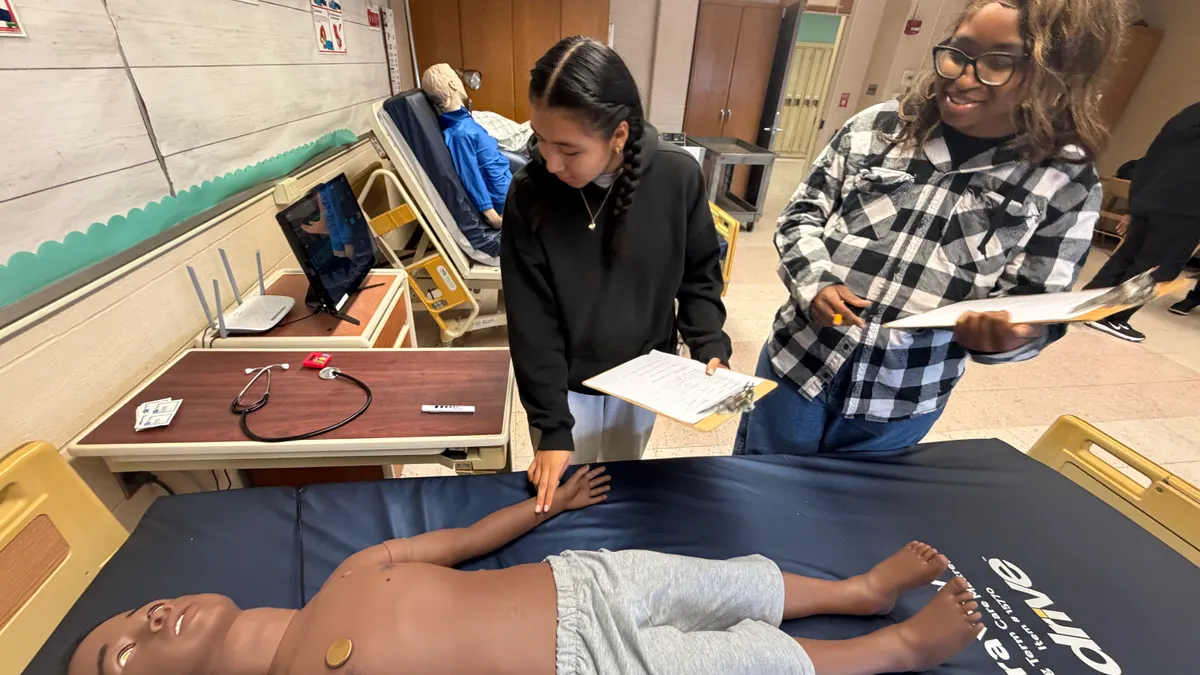Rhea Almeida is a research project manager and Parker Foster is a research associate at New York University Metro Center’s Center for Policy, Research & Evaluation.
Across U.S. public school districts, there are concerted efforts by conservative groups and think tanks to prevent the teaching of accurate history and critical thinking to our nation’s children.
Some drivers include classroom censorship, the outright banning of books from school curricula and libraries, and the attack on imparting social-emotional learning. Additionally, the anti-critical race theory movement, led by several Republican officials, activists and media personalities, seeks to perpetuate curricular colonialism by restricting and penalizing educators and support staff.
These punitive practices are furthered under the guise of parents’ rights to protect children and impart values. Conservative political organizations promote this ruse by invoking images of students facing indoctrination and unsafe educational conditions. For example, the Heritage Foundation published a story about children as young as 3 years old being brainwashed by their teachers and the radical left into adopting an “anti-American agenda.”
In light of education censorship, community organizers, educators, families and students are standing up to harmful messaging in a variety of ways.
For instance, a coalition of educators, including the legal advocacy organization Education Law Center and the Philadelphia Federation of Teachers, protested a Philadelphia-based conference held by Moms For Liberty — an influential right-wing conservative group pushing for censorship, anti-Black and anti-LGBTQ+ laws in education. The educator groups handed out books that were banned and publicly displayed signs denouncing the organization as a hate group.
Another example is Red Wine and Blue, a national advocacy group of Democratic parents taking on concerns like fearmongering in public education by participating in school board elections, campaigning against book bans, and advocating to get progressive proposals on state ballots. Alongside them are powerful student groups and youth leaders, such as Students Engaged in Advancing Texas, who are organizing a statewide movement against book ban legislation in their state.
As researchers on New York University Metro Center’s Policy, Research, and Evaluation team, we are dedicated to creating equitable systems, policies and practices in U.S. public education. Thus, we strongly align ourselves with movements that resist hateful rhetoric and policy that harms students. We strive to support organizing and advocacy efforts with evidence to catalyze change.
Research has often been used as a tool of domination, particularly against historically marginalized communities. In the current political climate, right-wing groups are limiting the liberties and rights of students by falsifying evidence and facts to further their agenda, such as twisting the meaning of terms like “social-emotional learning.”
We believe in the reclamation of research to illuminate truths, and we work in solidarity with youth, parents, educators and communities to ensure their experiences, voices and needs are accurately and respectfully represented. Our work is rooted in anti-racist, anti-homophobic, and culturally responsive, humanizing frameworks, and that it relies on rigorous evidence.
Our work is made possible by some fantastic organizations that commit themselves to equitable education and participatory change, and we invite you to engage with their work. In the process of engaging with our partners, we conducted a landscape analysis of existing parent leadership organizations across the nation. We then created a Parent Power Map & Directory, which is a national resource that visualizes existing organizations, their issue areas and their target communities.
These community partners help us develop meaningful research that can support organizers and leaders fighting the good fight for public education. For instance, case studies developed with four parent leadership organizations illustrate how powerful parent leaders and organizers can build awareness about an issue, increase representation in decision-making spaces, and take real steps toward advancing racial equity in their communities.
We also recognize the critical role of youth organizations and leadership. Young people have power, voice, agency and energy, and they are mobilizing across the country to speak up for their rights and freedoms in public education.
For instance, Detroit-based youth organizers in 2020 built the 482 Forward coalition, mobilizing young people and developing a city-wide education justice advocacy strategy focused on issues like health and safety in schools, public school funding and culturally competent resources. Another student group in California called Students Deserve successfully advocated for the Los Angeles Unified School District to divest from school police enforcement, invest in counselors, psychiatric social workers, and restorative justice coordinators, and establish a Black Student Achievement Steering Committee.
As outlined in this research brief by Metro Center's PRE, youth organizing has the power to strengthen academic engagement and helps participating youth develop relationship and networking skills. Alumni of youth groups draw upon skills like resilience and self-management to cope with racial and cultural stress, resist injustice and transform their college lives.
In light of the growing crisis in public education, it’s essential that stories of resistance, organizing, mobilizing and advocacy are told and retold. There is a role for all storytellers — researchers, journalists, writers, practitioners in public education — to play.
We, as researchers, hope to provide tangible resources and steps to activists committed to resistance against educational suppression and disinformation. Although there are no perfect remedies for these efforts, there are immediate actions to take.
One way to get involved is to pay attention to your local education news. What is being discussed at school board meetings? How can you fit in? What organizations are at the forefront of this work?
If you’re unsure of where to start or how to locate groups, we suggest using resources like the Parent Power Map and Directory and the Funders’ Collaborative on Youth Organizing to identify and uplift organizations. If you are already involved in campaigns led by groups that are not listed in the directory, feel free to add them. The directory is a living resource with room for growth and expansion.
Finally, we write this call to action with a sense of urgency. There is no time to waste in getting involved with local organizations. Find people in your community who are actively, collaboratively and equitably working toward public education justice.





 Dive Awards
Dive Awards












